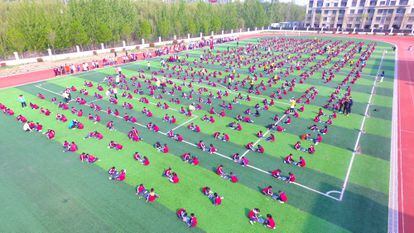Beethoven's music, chess and everything that was interpreted as a sign of "decadent capitalism" was banned in China during the Cultural Revolution (1965-1976), a sociopolitical movement that caused millions of deaths and arrests during the last years of the leader Supreme Mao Zedong (1893-1976).
Today all the media cover the World Cup in Astana (Kazakhstan) where Liren Ding fights to be the first absolute Chinese champion after defeating Russian Ian Niepómniashi on Thursday in the 4th of the 14 scheduled games;
the 5th is played on Saturday.
Since 1991, China has won every other title, women's, junior and team.
When Mao was already very ill and the Gang of Four
ruled ,
the police fined street gamblers and searched houses for technical books to burn in public squares.
But when Den Xiaoping - the author of the famous phrase: "It doesn't matter if the cat is white or black, if it catches mice" - took power, the policy towards chess changed completely with two objectives: to give priority to the female competition and to transfer as many Chinese chess players as possible -a very popular modality with a river that crosses the board- to the international one.
The success was tremendous: Xie Jun, born during the Cultural Revolution, was the women's world champion in 1991. And more strong players emerged, soon breaking the dominance of the Russians and Georgians.
Then men's chess was stimulated, which resulted in China taking gold at the 2014 Chess Olympiads in Trömso (Norway) and 2018 in Batumi (Georgia).
Meanwhile, between 1991 and 2018, Chinese children and adolescents won at some point the World Cups in all categories (under 8, 10, 12, 14, 16, 18 and 20), male and female.
But there are no Chinese right now among the top hundred under 20. The general secretary of the Chinese Federation, Tian Hongwei, attributes this to the pandemic (especially harsh in her country in terms of lockdowns and travel bans) and another specific factor: "We organize many tournaments that are not counted for the international ranking because we have many unranked players
.
"
Those registered in the federation are "about five million", but no one doubts that the real ones, distributed in all corners of the second largest country in the world after Russia, and the most populous, are many more.
Aerial view of the school chess competition in Liaocheng, China, in 2021 VCG (VCG via Getty Images)
The author of this report spent three days in Nanking in 2019, on the occasion of the under 8 and under 10 national championships. A large part of the thousand participants, the best from each province, were child prodigies.
It was normal, for example, that they spend their time in the elevator (the hotel was a skyscraper) solving math problems on electronic devices.
“The level of Chinese children in mathematics, physics and chemistry is very high,” confirms Hongwei.
That has a lot to do with the one-child policy, in force from 1979 to 2015 (now the limit is two): many parents are obsessed with the idea that their well-being in old age will depend on the purchasing power of their only son or daughter.
Thus, the pressure for children to get into the best schools and universities is often brutal,
Consequently, everything related to education and developing intelligence is extremely important.
The Mathematical or Mind Games Olympics have a huge impact.
But the country's meteoric progress creates an obstacle to producing more chess champions: “Before, being a highly competitive player was a very attractive way of life because there weren't many more tempting professions.
Now there are many options in the field of science, technology and art, and therefore it is more difficult for us to convince our talents to be professional players, ”explains Hongwei.
One of the clearest examples of this difficulty is Yi Wei, 23, who since he was a child emerged as one of the earliest talents in history.
“He has given priority to his university studies, which he finishes this year.
Chess and go (another mental discipline of great popularity in several Far Eastern countries) are the non-Olympic sports with government support comparable to the Olympics: “We have two training camps for the national team and the great talents, with everything paid by the government”, concludes Hongwei.
Subscribe to the
weekly newsletter 'Maravillosa jugada',
by Leontxo García
Subscribe to continue reading
Read without limits
Keep reading
I'm already a subscriber

